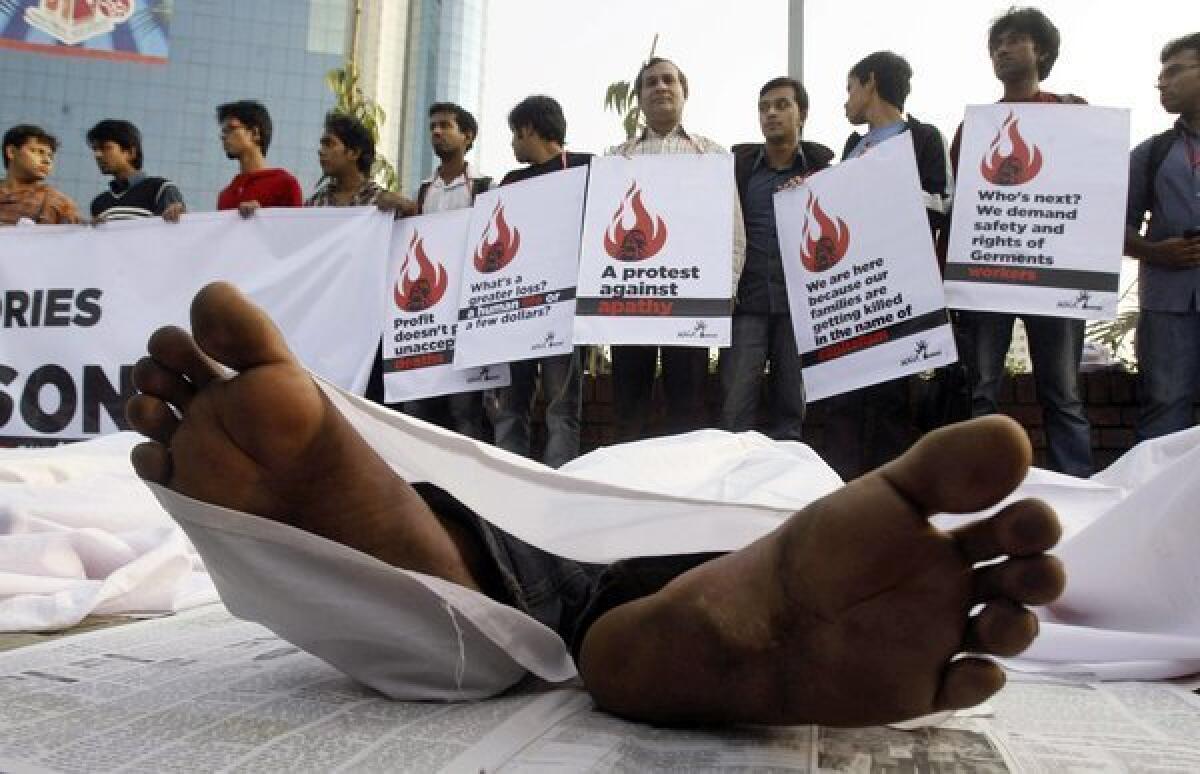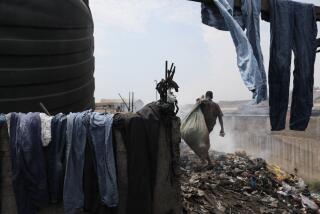A cheap T-shirt or a human life?

- Share via
A factory fire last month in which 112 Bangladeshi garment workers died raised questions not only about how a manufacturer with a poor safety record was allowed to continue its dangerous ways, but also about the responsibility of American companies to the workers they rely on around the globe.
At the time of the fire, Tazreen Fashions Ltd. was manufacturing clothes for well-known brands and retailers in the United States, including Disney, Sears, Wal-Mart and Enyce, as well as a licensee of the U.S. Marine Corps. There were no emergency exits at the factory, and employees alleged not only that fire extinguishers were inoperable but that bosses shut the main exit when the alarms sounded, ordering everyone back to work. Disney, Sears and Wal-Mart have said that Tazreen was not authorized to be making their products, yet somehow it was. Wal-Mart said it had ended its relationship with the factory before the fire but that a supplier subcontracted with Tazreen without Wal-Mart’s knowledge or permission.
Ignorance is a poor excuse. As long as American companies press for quicker production of goods at lower prices while failing to monitor the conditions under which those demands are met, corners will be cut in dangerous, unfair and inhumane ways. In the six years before the Tazreen fire, at least 300 workers perished in Bangladeshi garment factory blazes. In other countries, employees manufacturing items that would end up in American stores have been denied pay, forced to work grueling hours, exposed to toxic substances and even locked into truck trailers at night with guard dogs outside to prevent escape.
Wal-Mart deserves credit for trying in recent years to ensure that its overseas contractors meet certain basic requirements. It has its own network of auditors for factories and, according to Verite, a nonprofit research organization, has been examining how to improve pay and working conditions for agricultural workers. Other big retailers consult with organizations such as the Fair Labor Assn. to inspect working conditions overseas. More than 60 name brands in the clothing industry, including Gap, H&M;, Levi’s and Hanes, have joined the Sustainable Apparel Coalition, which focuses on both environmental issues and working conditions.
Yet none of this prevented the deaths at Tazreen. The question is how far American companies must go to meet their moral obligations in an increasingly complex and competitive global marketplace.
Companies are trying, says Dan Viederman, chief executive of Verite, but at this point the treatment of factory and agricultural workers is more an afterthought than a prime requirement. And even if consumers had a way of knowing whether foreign-made goods were produced under humane circumstances, it’s unclear how much they would care.
To ensure decent working conditions, American companies must recognize that more is needed than a contract with a manufacturer promising that no irresponsible subcontractors will be involved. Instead of short-term, one-time relationships with suppliers, they must build long-term relationships with factories that demonstrate a record of responsible behavior. They could award bonuses for continued safety records.
And there is power in corporate numbers. Though some companies have formed coalitions, they are always concerned that other companies will undercut them. But if all or most of the biggest retailers and brands joined forces, they would be in a position to demand that foreign governments enforce fire and other safety laws — or risk losing their business. A proposed Fire and Safety Building Agreement in Bangladesh would create an independent chief inspector, paid for by a consortium of businesses that would also contribute to a fund to renovate hazardous factories where their products are made. Only a couple of companies have signed on so far.
How much would all this cost American consumers? There’s a dearth of good studies on whether being a responsible corporate citizen would add $1 to the price of a T-shirt, or a quarter, or just 10 cents. But we should be willing to pay a little more for the assurance that our latest purchase hasn’t been bought at the price of human suffering.
More to Read
A cure for the common opinion
Get thought-provoking perspectives with our weekly newsletter.
You may occasionally receive promotional content from the Los Angeles Times.






